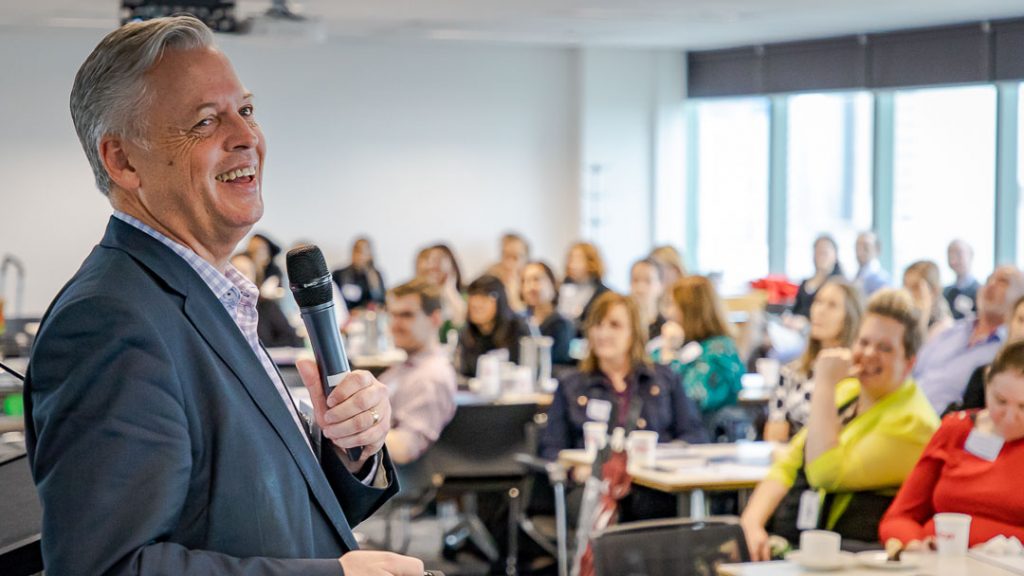Mark from Allianz Australia Insurance

Name
Mark Pittman
Job title
General Manager Government Services
Organisation
Allianz Australia Insurance Ltd
What are you/your organisation currently focusing on in terms of workplace health and wellbeing?
The majority of people in our business are front-line workers compensation case managers, who deal with difficult conversations almost every day. It’s critical we look after our own employees so they can look after our customers, particularly the vulnerable ones with psychological injuries.
In 2019 we piloted a program called ‘Here’s a Thought’ with great success. Here’s a Thought is a digital platform that delivers simple, evidence-based mental health and wellbeing ideas on things like how to boost support, kick start important conversations and improve lifestyle and work habits.
What aspect of workplace health and wellbeing does your organisation do well in?
Our business has a Culture and Engagement group (or The Culture Club as some of them call it) that is made up of volunteers from across the business. They work together to come up with activities or initiatives that are relevant and meaningful to them. I think having the employees own and drive this increases engagement, personal accountability and ultimately outcomes.
What’s your biggest challenge working in workplace health and wellbeing?
One of the biggest challenges we face working in workplace health and wellbeing is the perception of insurers in the community. There is still a residual lack of trust after years of workers compensation schemes that were considered adversarial; and then there was the more recent royal commission.
We’re committed to earning the trust of the community through genuinely putting our customers at the heart of our decisions. We understand it will take time but we’ll keep working at it.
How does WayAhead Workplaces add value to your organisation’s health and wellbeing program?
It’s been great being a member of WayAhead Workplaces. It gives us an opportunity to be among like-minded colleagues as well as ensure we stay on top of industry best practice. Last September because we hosted the members’ meeting, we had the opportunity to introduce the benefits of WayAhead Workplaces to some of our clients.
How do you deal with stress?
Life can be incredibly busy; I’m running a complex business and I’m dad to three teenagers – stress is unavoidable, and shouldn’t be all feared. I would say the better you understand yourself the better you can manage your stress. If you know your limits then you can switch off or take a break if it becomes too much.
What are the key issues and considerations for people in workplace health and wellbeing roles?
As a workers compensation insurer we have seen the significant rise of both psychological and secondary-psychological injury. In fact secondary-psychological injuries have increased by 80% over a 10-year period.
I wholeheartedly believe that the future success of any organisation is inherently tied to their ability to effectively support the wellbeing of their employees; that’s both in prevention and recovery at work.
How do you switch off from work?
My kids help me do that. They are all very active. I’m lucky to have the flexibility at work that allows me to be there for them. Just simple things like taking them to soccer or cricket practice or dance rehearsal.
I also enjoy cooking; in fact, every year I spend time baking Christmas cakes (my Grandma’s old recipe is a winner), which I give to friends and family.
What is your best time-saving tip?
My best time saving tip would have to be talk first, email second. I see so many occasions where people go back and forth over email when they could have picked up the phone and resolved the situation in minutes. It’s also great for building relationships, which are much harder to build over email.
What do you think the future of work health and wellness programs look like?
I’ve worked in personal injury for more than 20 years and in all this time I’ve never seen such accelerated change.
I think work health and wellness programs will see fairly rapid digital transformation that includes unlocking the potential of personal data and analytics so we can predict, prevent and better manage workplace wellbeing. Whether we’re (as in, both employer and employee) ready for this yet I’m not certain but we can’t afford to stand still that’s for sure.